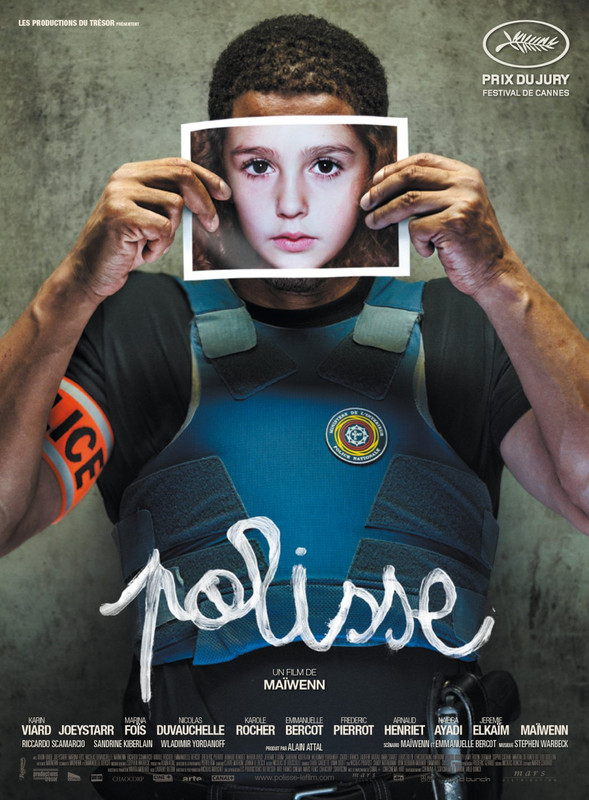Dir: Maiwenn
For an hour, Polisse had me. For its first half I was thinking this might be one of the best films I'd seen so far in 2012 (and, okay, that's a miserable standard, but still), and then it just begins to collapse, and by the end it has given us perhaps the most risible final shot I've seen this year and a truly dreadful last fifteen minutes. What the hell happened?
Polisse, as you may have guessed from the title, is about cops. Specifically it is about the day shift in Paris' child protection division. Co-writer/director Maiwenn (best known to UK audiences as one of the girls in Alexandre Aja's Switchblade Romance) takes a scattershot approach to plotting, letting the film unfold as short snapshots of the cases that the (large) team works on and of their personal lives, both at home and spending time together outside the office. Around this - perhaps as a way of justifying the fiction, perhaps as a (rather laboured) metaphor about her role as observer - Maiwenn casts herself as a photographer who is documenting the work of the child protection unit for a book commissioned by the local government.
For the first hour the film concentrates largely on work, with a few glimpses of the personal contextualising who these characters are (we meet about 8 major characters very quickly, and the film has to work fast to differentiate them). Here Maiwenn capably conveys the day to day grind of what must be some difficult and depressing Police work. What really sets this film apart from other cop movies is the sheer volume of cases we see the team working (and bulk of the film is set over a relatively short period, perhaps three months). It never ends, and that's why the fact that none of the cases receives any real development is okay; we're seeing this as the routine for the team, these things pass through their lives, occupying their time and minds briefly and then they have to move on.
What keeps the film really interesting in this early part is a set of fine performances. If nothing else there are a great selection of parts for women here (something of a rarity for a cop movie, where much of the time women are stuck playing worried wives or victims). Maiwenn's chief asset is a cast packed with fine character actresses (and, to be fair, actors). In major parts Karin Viard and Marina Fois are both excellent as very different police women who form the backbone of their child protection squad, but it's in the one scene parts that some of the best work is done. Audrey Lamy is striking as a mother who apparently doesn't realise that giving her son a handjob to help him go to sleep is wrong. Alice de Lencquesaing is brilliant in a five minute role as a rape victim who has just given birth to a stillborn child. For me though it's Sandrine Kiberlain who really stood out, quietly devastating as she's questioned by a suspicious Fois on the sexual predilections of her husband (Louis-Do de Lencquesaing), who is accused of molesting their daughter.
There is a little levity here too, but it's not handled brilliantly, and feels incongruous (as in an over-extended scene in which the cops crack up when a girl tells them how she got her phone back). The script and the structure are really where the problems lie, and they become more acute as the film goes on.
Once the various personalities of the members of the team have been established in the first hour the sequences following them home have really outlived their usefulness, but they don't stop. Indeed, Maiwenn and co-screenwriter Emanuelle Bercot (who acts here, and is an established writer and director herself) expand these scenes with a deeply tedious relationship between Mainwenn's photographer and one of the cops played by rapper Joeystarr. The relationship comes out of nowhere, and that's also the problem with many of the late developments with the characters.
Marina Fois gives a fine performance as Iris, and there are hints of bitterness and sadness about her (not least when she has to name a stillborn child), but the developments of the last fifteen minutes feel totally out of character, especially in one scene which degenerates into a yelling match between her and Karin Viard's Nadine. These are the times that I felt Polisse might be better served by being a TV series, as there would be more room both to explore individual cases, and allow the relationships between Iris and Nadine, Fred and Melissa and partners Mathieu (Nicolas Duvauchelle) and Chrys (Karole Rocher) to develop more organically.
On the whole there is enough good stuff, and even some great stuff, in Polisse that it is worth seeing, but it's also a big disappointment, because it starts with such promise, and falls apart so totally by the end.
★★★☆☆
★★★☆☆


No comments:
Post a Comment